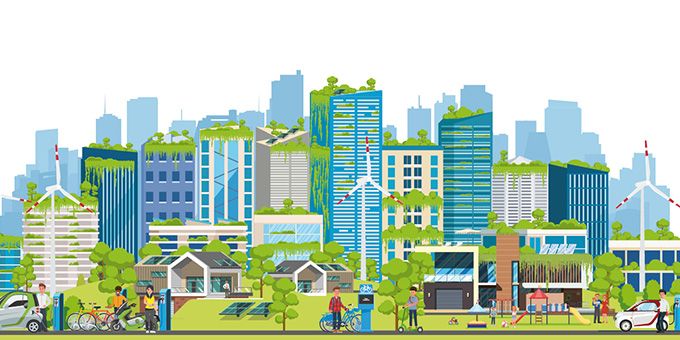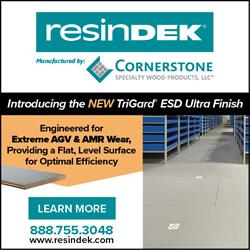A sound sustainability strategy consists of continuous change, improvement and further development. It requires the continuous commitment of everyone, from management to trainees. And it is made up of many small things.
 How Thoughtful Authentication Supports Your Sustainability Strategy
How Thoughtful Authentication Supports Your Sustainability Strategy

Article from | Elatec
Today, a sound sustainability strategy is mandatory for every company, regardless of the industry or the size of the organization. No one can do without it anymore, especially since the reporting requirements of the legislator are becoming increasingly stringent. The primary association with the term "sustainability" is still an ecological one. Most people first think of climate protection or the responsible use of natural resources. But sustainability encompasses much more. In addition to the "green" aspects, a comprehensive sustainability strategy also includes economic and social aspects, such as the treatment of employees, equity issues and the overall social mission that a company fulfills.
Sustainability and authentication? Yes, they belong together.
Sustainability is not something that can be tackled once and then shelved. A sound sustainability strategy consists of continuous change, improvement and further development. It requires the continuous commitment of everyone, from management to trainees. And it is made up of many small things. Every day, numerous actions contribute to reducing our carbon footprint—in both private and professional contexts. The energy-saving lamp. The reusable coffee cup instead of the disposable cup. The business trip by train instead of by car. The sustainability contribution of our actions is not always so obvious, and yet opportunities open up almost everywhere. A customized authentication strategy, for example, also makes a valuable contribution. The CO2 footprint can be demonstrably positively influenced with the right access solution—but that only applies if you look carefully when choosing a provider. The chosen access solution partner should set high standards for product and process quality, offer state-of-the-art technologies and have sustainability on its agenda. Only then can the level playing field be created that is needed.
In this blog post, we present four ways to reduce your carbon footprint through contemporary authentication and thus make a substantial contribution to sustainability.
Measure 1: Give preference to mobile authentication solutions.
Mobile authentication, based on Bluetooth Low Energy® (BLE) or Near Field Communication (NFC), is on the rise. Authentication with the smartphone is very convenient for users because they no longer need an additional identification medium. All they need to do is reach for their smartphone, which is always with them anyway. It is also the more environmentally friendly solution, because it eliminates the need to issue plastic ID cards or keyfobs. This results in less plastic waste, and the problem of later disposal or recycling of the ID media is also eliminated. And there is one more thing that should be emphasized: A lot of energy is saved, namely that which is required for the production and disposal of the identification media. This development toward mobile authentication can also take place gradually. Parallel operation of several technologies is quite common. This is especially true in environments where cards or keyfobs are sometimes indispensable. With universal RFID readers, up to 60+ different transponder technologies can be integrated. Here you are completely flexible and can implement your sustainability strategy gently, step by step.
Measure 2: Pay attention to high product quality & lifecycle management.
In addition to the ID media just discussed, the hardware also includes readers and other components. Here, too, it is worth paying attention to quality, because high-quality materials and workmanship lead to a longer service life for the hardware. Experience shows that readers and ID media of first-class quality remain in operation far longer, have a lower error rate and therefore need to be replaced much less frequently—which in turn means less waste. The volume of waste is reduced even further if the choice is made in favor of an RFID-based access concept; since the authentication process here is contactless, material wear is significantly lower, meaning that the components can remain in use for longer. But even the best hardware needs to be replaced at some point—what then? Make sure that your authentication partner takes back old devices and disposes of or recycles them properly, i.e., offers a solution for the complete product life cycle. This is the only way to consistently support your sustainability efforts.
Measure 3: Ensure future viability—with suitable software.
Software and hardware should be a strong duo in your authentication solution. In the age of digital transformation, technological developments are happening at a rapid pace, so your access system should be able to keep up with these developments as easily as possible. Experience has shown that this always works best when the hardware is already "future-ready" and can easily incorporate new technologies or map evolving requirements in the company without any problems. Otherwise, there is a risk that the hardware will have to be replaced again and again at short intervals—which is not only financially disadvantageous, but also has a negative impact on the sustainability balance sheet due to the large amount of waste caused by readers and ID media. As far as software components are concerned, many routine tasks (such as updates, maintenance, etc.) can now be performed remotely. This also contributes to the environmental accounting; a service employee does not have to make the trip to them every time. This saves fuel and travel time and also has a positive impact on the climate.
Measure 4: Aim for systems thinking instead of isolated solutions.
Modern authentication solutions are bundling more and more functions in a single system, from building access and printer management to internal company parking lot access, including e-charging. Everything is mapped via the same identification medium—and if a new function or even a completely new technology is to be integrated, the infrastructure is already prepared for it. These smart environments are incredibly convenient for users and strengthen the organization's appeal. At the same time, they allow faster, more agile growth—without necessarily being at the expense of the environment. On the contrary: by integrating e-charging in company parking lots, contemporary mobility is actively supported by the employer, while smart printing can minimize the use of paper and the consumption of ink cartridges. Modern access control solutions also offer the opportunity for continuous process optimization, which also has a positive effect on energy consumption. User behavior in the building can be recorded, and the ventilation, lighting or heating of the rooms can be automatically adjusted to the current demand. If, for example, no one is in the office on a Friday afternoon, the printer does not have to be on standby or the heating running.
Unleash your sustainability potential with ELATEC.
On the way to a continuously expandable ecosystem, ELATEC is your experienced, competent companion. We accompany you with first-class products in the form of universal readers that support 60+ transponder technologies and the appropriate, always up-to-date software. In this way, you remain open to all developments and can rely on a system whose components retain their value and are not disposable items that have to be discarded again with the next technological change.
The content & opinions in this article are the author’s and do not necessarily represent the views of ManufacturingTomorrow
Comments (0)
This post does not have any comments. Be the first to leave a comment below.
Featured Product

